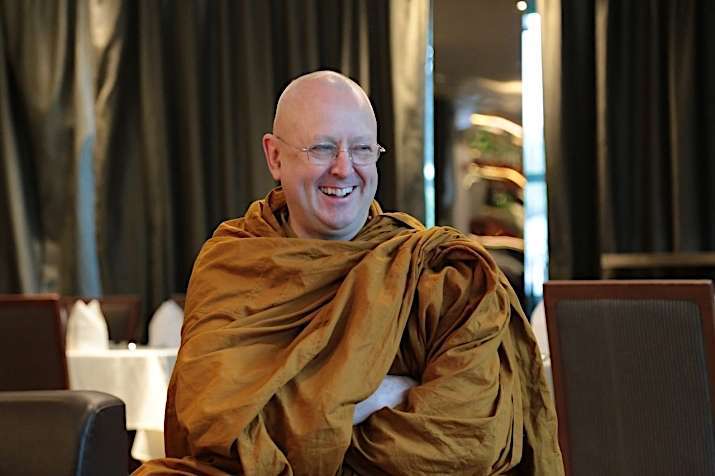FEATURES|THEMES|Science and Technology
On Technology and Human Connection: An Interview with Ajahn Brahm
 Ajahn Brahm. Photo by Buddhistdoor Global
Ajahn Brahm. Photo by Buddhistdoor GlobalWhen I was invited to interview Ajahn Brahm during his recent visit to Hong Kong, I was overjoyed at the prospect of meeting him again. My friend Cathy and I arrived at the lobby of his hotel 15 minutes early, but Ajahn was already waiting for us, looking resplendent in his ochre robe and luminous smile. He reminds me of the laughing Buddha as he has such a beatific smile and a wonderful way of making difficult concepts easy to understand. And he always has a story to tell.
Seeking to emphasize the role of technology in our interview, I asked him: “We live in a high-tech world where tech companies hold all our private data, we can perform banking transactions on our smartphones, and we can access a near-unlimited buffet of mental stimulation, yet we are often dependent on these devices to make our lives smoother. What is the right balance in allowing these technologies into our lives, if there is such a thing?”
True to his storytelling style, Ajahn responded with a story: “A teacher asked an 11-year-old boy what he wanted to be when he grew up. The boy replied immediately that he wanted to be an iPhone or an iPad. The teacher was perplexed and asked him why. The boy replied, ‘I want to be an iPhone or an iPad so that my parents can spend more time with me. They are always on their phones or tablets and every time I try to talk to them, they tell me to wait a minute and let them send this message or email, but they never have time for me. If I was an iPhone or an iPad they would be with me all the time.’”
The story rang so close to home that both Cathy and I nodded our heads in unison. I looked at all the devices that were on the table before us and felt a pang of guilt for doing the same. His story shed light on how we are all connected, yet so disconnected. Technology plays a very important role in our life, he acknowledged, but we need to stop and think of the cost. It has brought people from all over the world closer, yet has, sadly, distanced those that are closest to us.
Ajahn spoke about the theme of a Silicon Valley conference a few years ago titled: “Disconnect to Connect.” Silicon Valley executives are very wary about the amount of time their own children spend looking at screens. They know the damage it can do to a young developing brain and are adopting strict “rationed screen time” policies, sometimes banning them completely for extended periods.”
Interestingly, this is exactly the topic that I have been asked to speak about at an upcoming TEDx event, so I saw this as a wonderful opportunity to probe Ajahn further. How exactly do we disconnect?
“We need to have WiFi and data-free zones where we can completely disconnect,” Ajahn explained, inverting the usual idea of a WiFi zone. “There is a need for a digital detox. It’s an addiction that is harming us in ways that we cannot fathom right now. The trouble with any addiction if it’s right in front of you is that you need willpower to say no. You can say ‘no’ a few times but then you have to say ‘yes’ only once to get the high. It is therefore important that we create an environment that keeps us away from temptation. We require serious self-discipline that needs to be combined with a creation of spaces, an environment where our dependency is challenged.
“Our dependence on technology is reaching dire levels,” he continued. “Our brains are being outsourced to our smartphones. We hardly remember any phone numbers, we don’t read as much, we don’t invest time or effort to search for information, everything is available at the click of a button. We want instant gratification, and that could be our downfall.”
I understood exactly what Ajahn was saying. We really have outsourced our brains to our devices. We are being warned, but how many of us are heeding the warning?
I mentioned how technology was also making things convenient for us. I spoke about the ability to meditate with a smartphone and also how iPhones now come equipped with a screen-time app to aid self-regulation. With so many control mechanisms in place, are we not better off with technology?
Ajahn recalled how a 21-year-old student had shown him how easily he could order an AK-47 online: “As with anything else, everything has its benefits and its disadvantages. It’s up to the individual to self-monitor and exercise self-discipline. But we should make the environment conducive to exercising self-control. Technology can be great, it’s how we use it that will be the differentiator. We need to understand its place and not let it replace human connection.”
Speaking further on the topic of connection and disconnection, Ajahn observed that we also need to figure out what we want to connect to. If we are always connected to our devices then we become influenced by the outside world and feel very dissatisfied. He recommended that we connect with our friends and family and with nature. Nature has a way of balancing and calming us. We need to spend more time outside with the trees, the Sun, Moon, and the stars. Nature has much to offer us if we are ready to receive. We need to move away from our screens and learn to appreciate nature and its beauty—for our own wellbeing, we need to disconnect and reconnect with our inner selves.

Ajahn continued on the subject of connection, emphasizing how much he loves sharing live talks with receptive audiences. He does not give talks; he shares, and finds it very difficult to give a profound talk if the audience is not engaged and receptive to what he has to share. Ajahn believes that the receiver has to be open to receiving before the giver can give.
“The energy that is created when people are in sync is beautiful. If technology could replace human interaction, why do we go to rock concerts, to Dhamma talks, or to watch live sporting events? We do that because humans still want the human touch, the eye contact, we want to feel a sense of camaraderie and a sense of belonging. We want connection at the human level. The coldness of the screen cannot replace the warmth of the human interaction.”
Exploring the impact of technology on society more deeply, I noted that while Buddhism teaches the concept of non-self (Skt: anatman, Pali: anatta), like almost all global religions, Buddhism also maintains that human life has an essential dignity. Is this, I asked Ajahn, in danger of being violated by technologies that could fundamentally alter the trajectory of life—such as cryogenics (freezing people to be “re-awoken” at some future date) or cybernetic modification? Where should we draw the line between such dramatic and untested outcomes and trusted medicines and procedures that clearly improve human well-being, such as vaccines and surgeries?
Of course, Ajahn was able to state his case very clearly: “Let’s say that you have a very old car, and you love your car and cannot bear to part with it. It’s not running so you decide to spend millions to ‘freeze’ it. A few decades or centuries later you take out the same old car, would you still want the same car? Probably not. So why are we trying to save something beyond its use-by date? Buddhism believes in reincarnation—there is no need to save the old body, when you can always get a new body.
“Regarding the Buddhist tenet of non-self, people should not use that as an excuse to indulge in non-ethical behavior. Just like one cannot say that ‘I am nobody, God made me do this,’ we cannot hide behind the concept of non-self and pretend that our acts are out of our control. Everyone should take responsibility for their own thoughts, words, and actions. Everyone wants respect, love, and acceptance. Being human means interacting with love and compassion. This doesn’t mean hurting each other while hiding behind the concept of non-self or God. We humans have to respect and love each other in order to lead fulfilling lives.”
See more
Ajahn Brahm (Buddhist Society of Western Australia)
Return to Buddhistdoor Global’s 2019 Special Issue:














